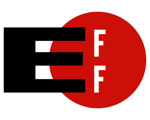EFF formally objects to W3C DRM proposal
 The Electronic Frontier Foundation (EFF) has announced that it has filed a formal objection to the W3C's draft for EME (Encrypted Media Extensions), a standard being developed by the W3C's HTML working group to enable standardised DRM plugins for streamed media. The draft standard has already been widely criticised, but the W3C has said it is continuing to develop the specification which is being driven by Google, Microsoft and Netflix.
The Electronic Frontier Foundation (EFF) has announced that it has filed a formal objection to the W3C's draft for EME (Encrypted Media Extensions), a standard being developed by the W3C's HTML working group to enable standardised DRM plugins for streamed media. The draft standard has already been widely criticised, but the W3C has said it is continuing to develop the specification which is being driven by Google, Microsoft and Netflix.
The objection is the first act of the EFF at the W3C. It joined the web standards organisation last week and says that it hopes to "help illuminate best practices for conveniently providing support for commercial content while still preserving user rights." The EFF points to work it did with the Broadcast Protection Discussion Group on the Broadcast Flag and European DVB DRM initiatives, saying those controls come from the same roots: "Hollywood's desire to suppress innovation and quash the wishes of individual computer owners."
In the full objection, the core argument at this point is not a technical one, but that the creation of EME and the implementation of usage controls on the web platform is out of the scope of the HTML working group and that use cases that are not related to usage control are already supported by existing web standards. EME was declared "in-scope" by the W3C's executive team in February. The EFF says that usage control like EME is not necessary and point to paywalls, watermarked content, advertising-supported and subscription models, which do not use DRM and do use existing web standards.
As solutions for the current issues, the EFF suggests that the W3C should set about developing a policy that covers not only how premium content be delivered to users over the Web, but also what conditions and how much control the user would surrender to make use of that delivery mechanism. The EFF also points out that a number of legislative reforms are being discussed in the US and Europe and a comprehensive copyright review is about to begin in the US. With those legal uncertainties, it suggests that the EME work at least be postponed until they are resolved.
The objection closes by pointing out that the HTML Working Group is sufficiently modular that standards can be evolved outside the group. If those standards are popular and supported, they can be brought into the working group's remit later. This suggestion would allow the supporters of EME to develop and implement it outside of the W3C; Google has already implemented EME in the Chrome browser and in Chrome OS.
(djwm)
![Kernel Log: Coming in 3.10 (Part 3) [--] Infrastructure](/imgs/43/1/0/4/2/6/7/2/comingin310_4_kicker-4977194bfb0de0d7.png)

![Kernel Log: Coming in 3.10 (Part 3) [--] Infrastructure](/imgs/43/1/0/4/2/3/2/3/comingin310_3_kicker-151cd7b9e9660f05.png)
















